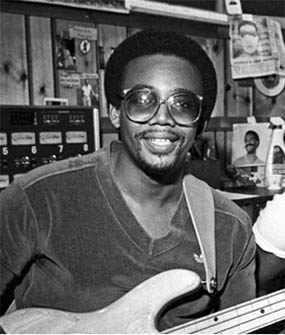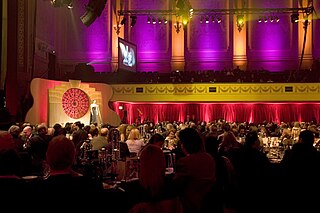Related Research Articles

Gloria Gaynor is an American singer, best known for the disco era hits "I Will Survive" (1978), "Let Me Know " (1979), "I Am What I Am" (1983), and her version of "Never Can Say Goodbye" (1974).

The Rock and Roll Hall of Fame (RRHOF), sometimes simply referred to as the Rock Hall, is a museum and hall of fame located in downtown Cleveland, Ohio, United States, on the shore of Lake Erie. The museum documents the history of rock music and the artists, producers, engineers, and other notable figures and personnel who have influenced its development.

The modern International Boxing Hall of Fame (IBHOF), located in Canastota, New York, honors boxers, trainers and other contributors to the sport worldwide. Inductees are selected by members of the Boxing Writers Association of America. The IBHOF started as a 1990 initiative by Ed Brophy to honour Canastota's world boxing champions, Carmen Basilio and Basilio's nephew, Billy Backus; the village of Canastota inaugurated the new museum, which showcases boxing's rich history. It is visited by boxing fans from all over the world.
Chicago house refers to house music produced during the mid to late 1980s within Chicago. The term is generally used to refer to the original house music DJs and producers from the area, such as Ron Hardy and Phuture.

Lawrence Philpot, known as Larry Levan, was an American DJ best known for his decade-long residency at the New York City night club Paradise Garage, which has been described as the prototype of the modern dance club. He developed a cult following who referred to his sets as "Saturday Mass". Influential post-disco DJ François Kevorkian credits Levan with introducing the dub aesthetic into dance music. Along with Kevorkian, Levan experimented with drum machines and synthesizers in his productions and live sets, ushering in an electronic, post-disco sound that presaged the ascendence of house music. He DJ'd at Club Zanzibar in the 1980s as well, home to the Jersey Sound brand of deep house or garage house.

Bernard Edwards was an American bass player and record producer, known primarily for his work in disco music with guitarist Nile Rodgers, with whom he co-founded Chic. In 2017, Edwards was selected as the 53rd greatest bassist of all time by Bass Player magazine.

Paradise Garage, also known as "the Garage" or the "Gay-rage", was a New York City discotheque notable in the history of dance and pop music, as well as LGBT and nightclub cultures. The 10,000 square feet (930 m2) club was founded by sole proprietor Michael Brody, and occupied a building formerly located at 84 King Street in the SoHo neighborhood. It operated from 1977 to 1987 and featured resident DJ Larry Levan.

Francis Warren Nicholls Jr., known professionally as Frankie Knuckles, was an American DJ, record producer, and remixer. He played an important role in developing and popularizing house music, a genre of music that began in Chicago during the early 1980s and subsequently spread worldwide. In 1997, Knuckles won the Grammy Award for Remixer of the Year, Non-Classical. Due to his importance in the development of the genre, Knuckles was often called "The Godfather of House Music".
The National Italian American Sports Hall of Fame is a 501 (c)(3) nonprofit institution honoring exceptional U.S. athletes of Italian descent. In 1977 George Randazzo created the Italian American Boxing Hall of Fame. This was as a means for raising money for local Catholic youth programs. After a successful year and dinner honoring 23 former Italian American boxing champions, Randazzo created the National Italian American Sports Hall of Fame. The original location was in Elmwood Park, Illinois. The first induction ceremony honored Lou Ambers, Eddie Arcaro, Charley Trippi, Gino Marchetti, Dom DiMaggio, Joe DiMaggio, and Vince Lombardi. Since its founding in 1978, more than 230 Italian Americans have been inducted into this hall of fame.
John Benitez, also known as Jellybean, is an American musician, songwriter, DJ, remixer, and music producer. He has produced and remixed artists such as Madonna, Whitney Houston, Michael Jackson, and the Pointer Sisters. He was later the executive producer of Studio 54 Radio. In December 2016, Billboard magazine ranked him as the 99th most successful dance artist of all-time.
The Television Academy Hall of Fame honors individuals who have made extraordinary contributions to U.S. television. The hall of fame was founded by former Academy of Television Arts & Sciences (ATAS) president John H. Mitchell (1921–1988). Inductions are not held every year.

Since 1988 the Australian Recording Industry Association (ARIA) has inducted artists into its annual ARIA Hall of Fame. While most have been recognised at the annual ARIA Music Awards, in 2005 ARIA sought to create a separate standalone ceremony ARIA Icons: Hall of Fame event as only one or two acts could be inducted under the old format due to time restrictions. Since 2005 VH1 obtained the rights to broadcast the show live on Foxtel, Austar and Optus networks; and each year five or six acts were inducted into the Hall of Fame with an additional act inducted at the following ARIA Music Awards.
The Warehouse is a historic building located in Chicago, Illinois in the United States, best known for the same-named nightclub catering to the gay and alternative communities that was established in 1977 under the direction of Robert "Robbie" Williams. It was Robbie Williams who on promotional posters would describe events at the Warehouse as 'house' parties or 'house' music. As such, the Warehouse is best known as the namesake for, and one of the origins of, house music. The Warehouse is specifically associated with Chicago house, and was the genre's birthplace under its first musical director, DJ Frankie Knuckles.
Xenon was a popular New York City discotheque and nightclub in the late 1970s and early 1980s. It was located in the former Henry Miller's Theatre at 124 West 43rd Street which, prior to Xenon, had been renamed Avon-at-the-Hudson and was operating as a porn house.

Chic, currently called Nile Rodgers & Chic, is an American disco band that was formed in 1972 by guitarist Nile Rodgers and bassist Bernard Edwards. It recorded many commercially successful disco songs, including "Dance, Dance, Dance " (1977), "Everybody Dance" (1977), "Le Freak" (1978), "I Want Your Love" (1978), "Good Times" (1979), and "My Forbidden Lover" (1979). The group regarded themselves as a rock band for the disco movement "that made good on hippie peace, love and freedom". In 2017, Chic was nominated for induction into the Rock and Roll Hall of Fame for the eleventh time.
The International Latin Music Hall of Fame (ILMHF) was an annual event established in 1999 and held in New York City to honor artists who have largely contributed to the Latin music genre.
Boogie is a rhythm and blues genre of electronic dance music with close ties to the post-disco style, that first emerged in the United States during the late 1970s to mid-1980s. The sound of boogie is defined by bridging acoustic and electronic musical instruments with emphasis on vocals and miscellaneous effects. It later evolved into electro and house music.
The Pennsylvania Sports Hall of Fame (PSHF) is a nonprofit organization established in 1962. It is the only community-based hall of fame in the United States. At its annual convention and induction ceremonial, the PSHF inducts athletes, coaches, administrators, and those involved in sports medicine and the sports media, whose athletic achievements "have brought lasting fame and recognition to the State of Pennsylvania". At the induction ceremony, ten living and two deceased inductees are honored, with the presentation of a Gold Inductee medallion with pendant. The convention and ceremonial are rotated among the chapters of the Central, Eastern, Northern, and Western regions.

The Bare Knuckle Boxing Hall of Fame is a museum and hall of fame in Belfast, New York, dedicated to the sport of bare-knuckle boxing. It is housed in barns that were once owned by the Greco-Roman wrestling champion and physical culture pioneer William Muldoon. The heavyweight boxing champion John L. Sullivan, who fought in both bare-knuckled and gloved boxing contests, trained in these barns under Muldoon's guidance for his championship bout against Jake Kilrain in 1889. The barns were originally across Main Street from their current location, on the grounds of the Belfast Catholic Church. They were bought, moved, and restored by Scott Burt when the church became no longer interested in maintaining them. Burt opened the Hall of Fame in 2009, when it had its first induction class.
The nonprofit West Virginia Music Hall of Fame was established in 2005, to honor the legacies of the state's performing artists in multiple music genres. This hall of fame is the brainchild of its founder, musician Michael Lipton, who was inspired by a visit to the Country Music Hall of Fame and Museum in Nashville, Tennessee. The first exhibit was records from his personal collection.